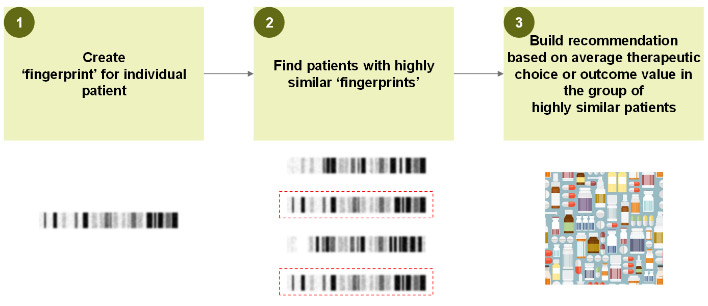The world is a clinical trial
Medical decision making is becoming ever more difficult. To make the best possible decisions, all relevant supporting information – both from evidence and from experience - needs to be easily accessible and structured so that it is relevant and accurately applicable to the specific patient. We have tools at our disposal to incorporate evidence into the medical decision making process. Tools to systematically learn from experience – both one’s experience as well as that of colleagues - have not yet come to fruition.
This paper presents an algorithm that allows doctors to systematically incorporate their individual as well as collective experience into the decision-making process. The algorithm was developed and tested on data from Amphia hospital in Breda, The Netherlands. Our algorithm consists of three steps: 1) create a unique ‘fingerprint’ for every patient, 2) compare similarities between ‘fingerprints’, and 3) develop insights and/or recommendations. The steps are summarized in the figure below.

As a proof-of-concept, we have shown that the fingerprint model can explain and predict two clinical outcome measures: 1) length of stay, and 2) probability of ICU admission. The fingerprint model matches or surpasses the best existing and published models. The algorithm can be applied to other outcome measures as well, and can provide decision recommendations based on outcome differences within highly similar patient groups.
We see three possible areas of application for the algorithm:
- Learning on the go: an upgraded version of the current proof-of-concept, in which the collected ‘experience’ data points are combined with ‘evidence’ in the form of (data from) publications.
- The world is a clinical trial: the incorporation of the algorithm into a ‘self-learning’ model, which could revolutionize clinical research.
- Management information: the algorithm can be applied for payers and providers alike, for example in the individualized prediction of cost and scheduling.
We hope this study will contribute to advancing the fields of clinical decision making and research. Please do not hesitate to contact us for further discussion.